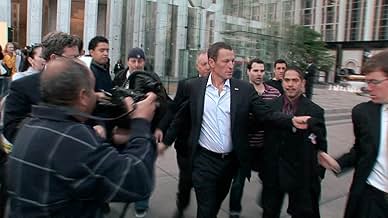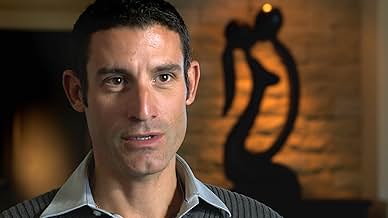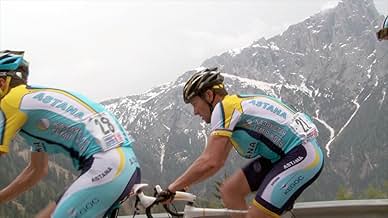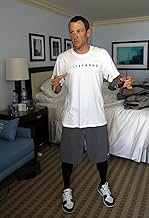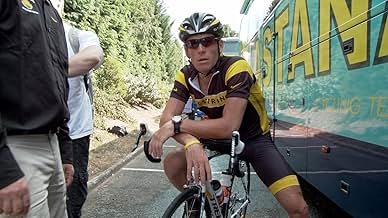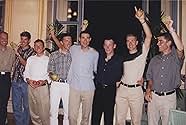IMDb RATING
7.2/10
8.1K
YOUR RATING
A documentary chronicling sports legend Lance Armstrong's improbable rise and ultimate fall from grace.A documentary chronicling sports legend Lance Armstrong's improbable rise and ultimate fall from grace.A documentary chronicling sports legend Lance Armstrong's improbable rise and ultimate fall from grace.
- Nominated for 1 BAFTA Award
- 2 wins & 8 nominations total
Michael Bloomberg
- Self - NYC Mayor
- (archive footage)
Bill Clinton Jr.
- Self - Former US President
- (archive footage)
Anderson Cooper
- Self - Interviewer
- (archive footage)
Sheryl Crow
- Self - Lance's Girlfriend
- (archive footage)
Alex Gibney
- Self - Narrator
- (voice)
Tyler Hamilton
- Self - Teammate
- (archive footage)
- Director
- Writer
- All cast & crew
- Production, box office & more at IMDbPro
Storyline
Did you know
- TriviaFilmmaker Alex Gibney followed Lance Armstrong for four years with the intent of chronicling his return to cycling after retirement as Armstrong tried to win his eighth Tour de France. Unexpectedly, Gibney was also there when Armstrong admitted to doping, which resulted in the film being retitled from "The Road Back" to "The Armstrong Lie."
- Quotes
Lance Armstrong: I viewed my battle with cancer as an athletic competition. But in that, you either win or you lose. When you lose, or if you lose, you die. So I took that perspective, which is a little dark, and I put it into everything I've done since then. I like to win. But more than anything, I can't stand the idea of losing, because, to me, that equals death.
- ConnectionsFeatured in At the Movies: Venice Film Festival 2013 (2013)
Featured review
To judge something in terms of how it's executed is all well and good but in a documentary such as this the message takes precedence. It seeks the truth and all the arguments aren't displayed for that to emerge. If it it simply allowed the viewer to make up his own mind then that would be o.k but the film displays a bias thereby becoming a vehicle and a misleading one at that.
The fact that doping was prevalent in cycling and still plays a large factor is obvious. If Armstrong was racing on a level playing field of dopers then that to me would also have been acceptable. However this was far from the case.
Non of Lance's team mates were caught doping whilst they were in his team. Meanwhile all his major competitors were absent from the start line at various points in time due to suspensions and had some key teammates missing from every tour for the same reason. Throughout all the disruptions, devastation, controversy and even a suicide Armstrong was always there with a full strength squad.
The film touches on the importance of team mates and how on all of his wins Armstrong rode alone for only minutes at a time, but fails to take the next step and look at how the various disqualifications imposed on all other teams (apart from his own during his winning years) affected his competitors. Had the film done this Armstrong would never have agreed to be in it because he's still pushing the lie that he won those seven Tours fair and square once we accept as fact that they were all doping.
The UCI had invested in him and were being invested in by a lot of the same sponsors, they allowed many cyclists to burn whilst protecting this man. The film doesn't touch on those aspects and the film maker remains a fan.
I gave the film five stars because it is well shot and well put together. I am a cycling fan and it's view of the race was a pleasure to watch. There is stock footage obviously but the film does follow Armstrong and films the 2009 race independently. The film gives an insight into what it takes to be a professional rider and rider's relationships with one another and their team officials.
Some of the people interviewed I've never seen interviewed i.e doctor Ferrari, which added another point of interest for me.
The 2009 and other pre-'outed' interviews were interesting, giving an insight into Armstrong's mentality at the time and although there is marked contrast to his post-confessional ones it's by no means a transformation and a true repentance. His approach to people seems outwardly very different now, but his attitude towards his legacy and the morality of his actions remain to all intents and purposes unchanged. The exclusions of Paul Kimmage and Greg Lemond from the documentary also indicate this.
I'd say watch the film but bear the other stuff in mind too.
The fact that doping was prevalent in cycling and still plays a large factor is obvious. If Armstrong was racing on a level playing field of dopers then that to me would also have been acceptable. However this was far from the case.
Non of Lance's team mates were caught doping whilst they were in his team. Meanwhile all his major competitors were absent from the start line at various points in time due to suspensions and had some key teammates missing from every tour for the same reason. Throughout all the disruptions, devastation, controversy and even a suicide Armstrong was always there with a full strength squad.
The film touches on the importance of team mates and how on all of his wins Armstrong rode alone for only minutes at a time, but fails to take the next step and look at how the various disqualifications imposed on all other teams (apart from his own during his winning years) affected his competitors. Had the film done this Armstrong would never have agreed to be in it because he's still pushing the lie that he won those seven Tours fair and square once we accept as fact that they were all doping.
The UCI had invested in him and were being invested in by a lot of the same sponsors, they allowed many cyclists to burn whilst protecting this man. The film doesn't touch on those aspects and the film maker remains a fan.
I gave the film five stars because it is well shot and well put together. I am a cycling fan and it's view of the race was a pleasure to watch. There is stock footage obviously but the film does follow Armstrong and films the 2009 race independently. The film gives an insight into what it takes to be a professional rider and rider's relationships with one another and their team officials.
Some of the people interviewed I've never seen interviewed i.e doctor Ferrari, which added another point of interest for me.
The 2009 and other pre-'outed' interviews were interesting, giving an insight into Armstrong's mentality at the time and although there is marked contrast to his post-confessional ones it's by no means a transformation and a true repentance. His approach to people seems outwardly very different now, but his attitude towards his legacy and the morality of his actions remain to all intents and purposes unchanged. The exclusions of Paul Kimmage and Greg Lemond from the documentary also indicate this.
I'd say watch the film but bear the other stuff in mind too.
- sammy-balamy
- Feb 16, 2014
- Permalink
- How long is The Armstrong Lie?Powered by Alexa
Details
- Release date
- Country of origin
- Official site
- Language
- Also known as
- Lance Armstrong: The Road Back
- Production companies
- See more company credits at IMDbPro
Box office
- Gross US & Canada
- $383,294
- Opening weekend US & Canada
- $28,992
- Nov 10, 2013
- Gross worldwide
- $594,394
- Runtime2 hours 4 minutes
- Color
- Sound mix
Contribute to this page
Suggest an edit or add missing content











